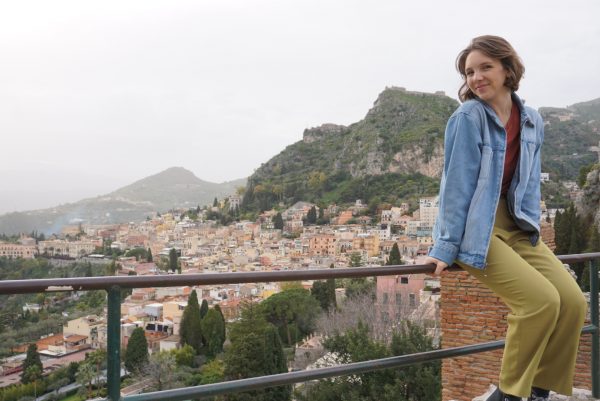Absence with a Purpose
Letting go of kids exposes a raw place in my soul, and an unyielding lump in my throat. I cried every time they started a new phase of life: preschool, kindergarten, high school, college, marriage. Something inside a parent dies a little every time a child crosses another threshold. And yet, deep down, we know it is how it is supposed to be. How it MUST be for them to make their own decisions and their own way in life. And we are proud to have played whatever small part we did in their development. We are thrilled for them. We throw parties and confetti, and we clap our hands as we wave goodbye. But they leave a hole of what was, and I am reminded of the strange mix that is saudade.
Sending my youngest child back to Europe after Christmas break to finish her year studying abroad, I got a big dose of what I later learned was saudade. The origin of the word describing Portuguese sailors seemed unusually fitting.
A note I wrote to slip into her suitcase:
In France, instead of “I miss you,” people say, “You are missing from me.” That’s how it feels when you’re not here. Part of me is missing. Something special and important. I felt it when you went to kindergarten, to college, and now again as you go back overseas. But also, it feels like part of me is on an adventure, and I love that. Stay safe, brave girl. Call me soon and tell me how our adventure is going. I love you, Mom
As parents constantly releasing little bits of our children as they grow, we understand saudade. Saudade is, at its core, about relationships. The blissful glue that binds them together and the calamity of this broken life that tears them apart. It is about missing something that cannot be replaced with anything else, and feeling the gaping hole of its absence. But it is absence with a pull, absence for a purpose.
If you are yearning for a lost soul to return to you someday, you know saudade.
If you welcome the still-painful memories of someone who has died, you know saudade.
If you’re an empty-nester waiting for future grandchildren, you know saudade.
If you endure paralyzing loneliness in the second half of a full life, you know saudade.
If you’re living with chronic illness, disease, or pain, you know saudade.
If you suppress the constant feeling that something important is missing in your life, you know saudade.
If you are alive at this moment, you may not know it, but you know saudade.
That strange presence of absence will eventually affect all of our relationships. But none with more pull than our relationship with God. Wise men such as Solomon and Pascal knew about saudade.
Solomon wrote in Ecclesiastes that God placed eternity in our hearts. Made in His image, our oneness with God was there in the beginning, but we have become separated. We were born with free will. And it had to be this way for us to truly love, to freely choose, God. Until we choose Him, He and His eternal nature are missing from us. And that heart vacuum constantly aches to be filled as we yearn for an eternity we can sense, an eternity we once knew.
Modern thinkers have now acknowledged Solomon’s wisdom. Sociologists have confirmed that human beings have a belief in eternal life hardwired into us, regardless of the amount (or complete lack of) religious exposure. We all have a longing, a knowing, for forever and the Eternal God. It just is.
We can choose to perfectly fill that hole once occupied with the Everlasting or we can search for something else to clumsily and cheaply pour into the spot. But all the little shards of this life that we dump in will never fill that infinite vacuum.
Pascal’s idea of a God-shaped vacuum in our hearts speaks to this. From Pensees #425:
“What else does this craving, and this helplessness, proclaim but that there was once in man a true happiness, of which all that now remains is the empty print and trace? This he tries in vain to fill with everything around him, seeking in things that are not there the help he cannot find in those that are, though none can help, since this infinite abyss can be filled only with an infinite and immutable object; in other words by God himself.”
This God-shaped space in our hearts represents the most important saudade we must deal with in this life. How we satisfy that longing will define our destiny. But we are not left in the dark as we seek to fill that void.
The most gaping hole ever was the empty tomb. Christ’s tomb explains saudade. The emptiness first grieved His followers, then it saved the world. Absence with a purpose. Ironically, we all need that tomb, that hole, to understand the answer to our own heart’s void. Our heart vacuum can only be filled by the One who triumphed over the ultimate emptiness. So in a real sense, it took a hole to fill a hole.
In case you’re wondering, my daughter returned from Europe in one piece. More mature, more compassionate, and yes, even more independent. Just as God allows saudade in our lives for a reason, and just as the tomb was needed for the resurrection, I guess my daughter’s absence had a purpose, too.



“Having a child is having your heart walk around outside of your body.” Truer words were never spoken.
Thanks for sharing your heart with us!
I love that, Cindy!
Lori, your words are music to my heart. I love how you say we parents are “”constantly releasing little bits of our children as they grow.” We want to savor every moment, but in the moment we get too wrapped up in the details to appreciate the present moment. My 6 year old is lying here beside me in bed. I always look forward to bedtime, but then look at him asleep and want him to hurry and wake up. 🙂
Thank you for the sweet words of encouragement. I remember those days well! You are doing a remarkable job of savoring what’s important. You are the role model I needed years ago!
Lori. I have been catching up on your blog. I love this one and will pass it on to Cindy and my sister. Beautiful and calming thoughts. Mackey is in Cuba of all places. Waiting for her to come home. One more week she has been there for two months. A bit of anxiety needless to say.
Oh, Carol! I can relate. Prayers for Mackey and for Cindy! Thank you for your sweet comments.